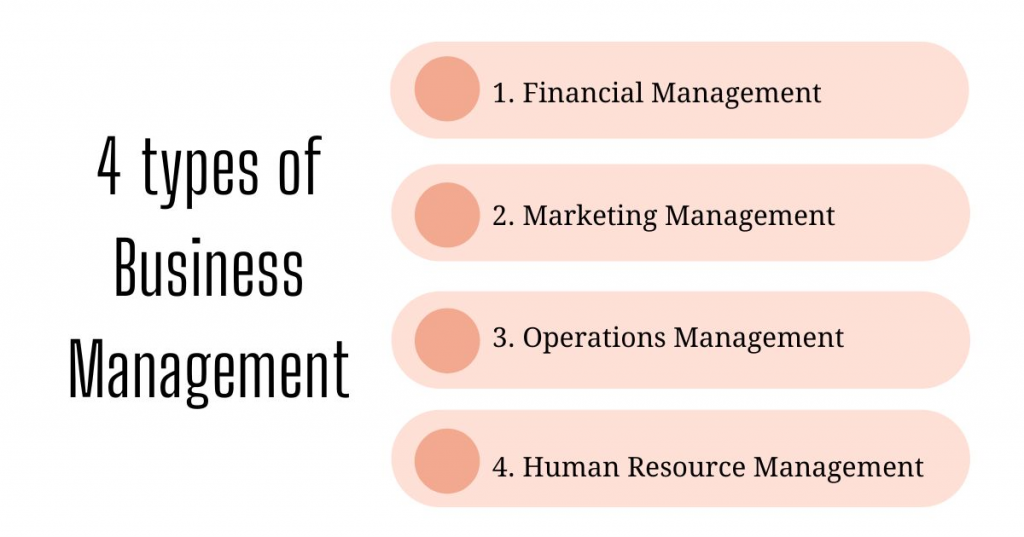Business Management: Definition, Importance, Types & Salary
Business management is a multifaceted discipline that encompasses the planning, organizing, leading, and controlling of an organization's resources to achieve specific goals. It is a critical function in any organization, driving efficiency, growth, and profitability.
Understanding business management involves exploring its definition, its importance in various contexts, the different types of management roles, and the potential salary ranges for these positions. This article delves into these aspects, providing a comprehensive overview of what business management entails, why it is essential, the different managerial roles, and the financial rewards associated with these careers.
Whether you are an aspiring business manager, a seasoned professional, or simply curious about the field, this guide will offer valuable insights into business management.
What is Business Management?

Business management is a broad field that encompasses the coordination, administration, and oversight of business operations to achieve organizational objectives. It's essentially the art and science of running a business effectively. It involves a range of activities, from strategic planning and decision-making to supervising daily operations and managing resources efficiently.
Resources are diverse, including human resources, finance, facilities, machinery, and relationships. So, business management involves a combination of strategic thinking, operational skills, and leadership capabilities to ensure the organization's success and sustainability.
Business management is essential for the successful functioning of any organization, regardless of size or industry. Undeniably, business managers play a critical role in achieving organizational success and driving growth.
Importance of Business Management

The importance of business management can't be denied in today's competitive business landscape. It is the guiding force of an organization toward its goals and ensures its long-term sustainability. Here is a closer look at why good business management is essential:
Achieve organizational goals
Effective business management ensures that all aspects of an organization fit with its strategic goals. Managers plan, organize, lead, and control resources to achieve these objectives, ensuring the company stays on track toward its mission and vision.
Adaptability to Change
The business environment is dynamic, with constant changes in technology, market trends, and economic conditions. Effective business management allows organizations to adapt to these changes quickly. Managers can develop contingency plans and strategies to navigate uncertainties and maintain stability.
Risk Management and Mitigation
Business management involves analyzing data, evaluating options, and making informed decisions. Managers use various analytical tools and techniques to make decisions that are in the best resolution of the organization. It leads to better outcomes and helps avoid costly mistakes.
Driving Growth and Profitability
Effective management strategies will help make better decisions in product development, marketing, and sales. It translates to attracting new customers, retaining existing ones, and ultimately boosting sales and revenue.
Optimizing Operations and Productivity
Business management optimizes the use of an organization's resources, including human, financial, and material resources. By effectively managing these resources, businesses can minimize waste, reduce costs, and improve overall efficiency, leading to better financial performance.
Business management optimizes how to use an organization's resources, which includes human, financial, and material resources. By effectively managing these resources, businesses can minimize waste, reduce costs, and improve overall efficiency, leading to better performance.
Good management practices ensure that employees are motivated, well-trained, and equipped with the necessary tools to perform their tasks efficiently. Managers can foster a positive work environment and set clear performance expectations. So, they easily enhance employee productivity and overall organizational performance.
Building a Strong Workforce and Culture
In essence, business management goes beyond just managing day-to-day operations. It is about creating a strategic roadmap, fostering a positive work environment, and making informed decisions that drive growth, profitability, and long-term success.
Good management practices involve investing in employee development through training and career advancement opportunities. Managers who support employee growth create a motivated and engaged workforce, leading to higher job satisfaction and lower turnover rates.
Customer Satisfaction
Effective management ensures that the organization consistently delivers high-quality products and services, meeting or exceeding customer expectations. This leads to building strong relationships, enhancing the business's reputation, and achieving long-term success.
Strategic Planning and Long-term Success
Business management involves setting long-term goals and developing strategic plans to achieve them. Organizations having a clear roadmap and continuously monitoring progress can ensure sustainable growth and long-term success.
4 Types of Business Management

Business management can be categorized into various types based on the focus and functions they perform within an organization. The four primary types of business management are Financial Management, Marketing Management, Operations Management, and Human Resource Management.
1. Financial Management
Financial management involves planning, organizing, controlling, and monitoring financial resources to achieve an organization's financial goals.
Key Functions:
- Budgeting: Creating a budget to allocate financial resources effectively.
- Financial Reporting: Preparing financial statements and reports to provide insights into the company's financial health.
- Investment Management: Making decisions about where to invest the company's funds for maximum returns..
- Risk Management: Identifying and mitigating financial risks to protect the organization's assets.
- Cost Control: Managing costs to ensure profitability and efficiency.
Importance:
- Ensures the organization remains financially stable and profitable.
- Helps in making informed financial decisions and planning for future growth.
- Maintains investor and stakeholder confidence through transparent financial practices.
2. Marketing Management
Marketing management focuses on identifying customer needs and wants, creating value, and delivering products or services to satisfy those needs.
Key Functions:
- Market Research: Gathering and analyzing data about market trends, competitors, and customer preferences.
- Product Development: Creating and improving products to meet market demands.
- Brand Management: Building and maintaining a strong brand image and reputation.
- Advertising and Promotion: Developing strategies to promote products and services to target audiences.
- Sales Management: Overseeing sales strategies and processes to drive revenue growth.
Importance:
- Helps in attracting and retaining customers.
- Drives revenue growth through effective marketing strategies.
- Builds brand loyalty and enhances the company's market presence.
3. Operations Management
Operations management involves overseeing the production and delivery of goods and services. It focuses on optimizing processes to ensure efficiency and effectiveness.
Key Functions:
- Process Management: Designing and managing processes to produce high-quality products efficiently.
- Supply Chain Management: Coordinating the flow of materials and products from suppliers to customers.
- Quality Control: Ensuring products meet quality standards and specifications.
- Inventory Management: Managing inventory levels to meet customer demand while minimizing costs.
- Logistics Management: Planning and controlling the movement of goods and services.
Importance:
- Ensures efficient and cost-effective production processes.
- Maintains high-quality standards, enhancing customer satisfaction.
- Optimizes the supply chain to reduce costs and improve delivery times.
4. Human Resource Management (HRM)
Human Resource Management focuses on managing people within the organization, ensuring that the workforce is efficient, motivated, and aligned with the company's goals.
Key Functions:
- Recruitment and Selection: Attracting, selecting, and onboarding the right talent for the organization.
- Training and Development: Providing employees with the necessary skills and knowledge to perform their roles effectively.
- Performance Management: Evaluating and managing employee performance to enhance productivity.
- Compensation and Benefits: Designing and managing compensation structures and benefits programs.
- Employee Relations: Ensuring a positive work environment and addressing employee concerns and conflicts.
Importance:
- Attracts and retains talented employees.
- Enhances employee satisfaction and motivation.
- Ensures compliance with labor laws and regulations.
Understanding the four types of business management - financial, marketing, operations, and human resource management - is essential for the effective functioning of any organization. Each type plays a critical role in ensuring the business operates smoothly, meets its goals, and remains competitive. By integrating these management types, businesses can achieve holistic growth and success.
Business management salary

According to information from Indeed, one of the largest and most popular job search websites in the world, the average salary for a business manager in the United States is $76,382 per year. Additionally, business managers receive an average of $6,000 per year in profit sharing. This salary data is based on reports from approximately 2,700 individuals currently employed in this role.
The salary for business management roles in the United States can vary significantly depending on factors such as job title, industry, location, level of experience, and company size. However, here is a general overview of the average salaries for some common business management positions in the US:
Financial Manager: Financial managers, who oversee the financial health of organizations, earn an average annual salary of around $166,050 in 2022, as reported by the US News Money.
Marketing Manager: Marketing managers, who are responsible for developing and implementing marketing strategies, earn an average annual salary of about $107,927, according to Glassdoor.
Operations Manager: Operations managers, who oversee daily operations and ensure efficiency, earn an average annual salary of around $73,865, according to Indeed.
Human Resources Manager: Human resources managers, who are responsible for recruiting, hiring, and managing personnel, earn an average annual salary of approximately $119,962, according to Salary.com.
It's important to note that these figures are averages and can vary based on factors such as geographic location, industry trends, company performance, and individual qualifications. Additionally, bonuses, profit-sharing, and other forms of compensation can significantly impact the total earnings of business management professionals.
Skilltrans recommends related courses to enhance your knowledge and skills in business management. Please click on the course name below to learn more:
Online Business Masterclass: Sell Your Own Digital Products
This course isn't just about creating your passive income online business and hoping people find it. We teach you digital marketing, which includes free organic marketing and paid advertisements. You'll learn how to set up proper email marketing campaigns, drive traffic to your digital products with social media marketing and content marketing. This includes sections on using Facebook Pages, Facebook Groups, Instagram, and YouTube. You'll also learn about paid advertising, using Facebook Ads, Instagram Ads, and Youtube Ads to drive even more traffic to your online business.
Business Branding With Personality: Build An Authentic Brand
Brand Archetypes have been used by storytellers and filmmakers for generations in order to make their audience feel something for their characters and that’s exactly what we’ll be diving into in this course. We'll uncover where brand archetypes have come from and their scientific background and how they are applied in business strategy as brand archetypes in order for brands to connect with their audience.
Beginning Project Management: Project Management Level One
In this course, we’ll examine the absolute basics of project management. Everyone has to start somewhere, right? In this fundamental course, we will explore the big picture of project management and the project management life cycle. You’ll finish this course with an excellent grasp of project management, your roles and responsibilities as a project manager, and how to move forward in your career as a project manager.
Conclusion
In conclusion, business management is a cornerstone of organizational success, encompassing a range of functions essential for achieving strategic objectives and driving growth. Throughout this article, we have explored the definition of business management, its pivotal importance in various contexts, the diverse types of management roles, and the associated salary considerations.
If you want to learn more skills to become a good business manager, you can easily register for these courses at Skilltrans today.

Meet Hoang Duyen, an experienced SEO Specialist with a proven track record in driving organic growth and boosting online visibility. She has honed her skills in keyword research, on-page optimization, and technical SEO. Her expertise lies in crafting data-driven strategies that not only improve search engine rankings but also deliver tangible results for businesses.



